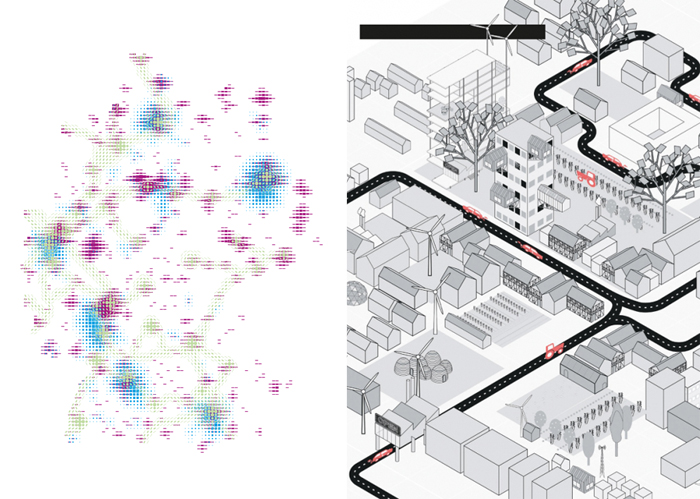
Matthias Böttger, Stefan Carsten, Ludwig Engel
With contributions by Thomas Auer, Armen Avanessian, Stefan Bergheim, Matthijs Bouw, Armin Linke, Erik Swyngedouw and more
Graphic design by onlab
Lars Müller Publishers
How will societal circumstances shape the built environment in Germany? Which factors trigger urban and regional changes? The publication Speculations Transformations addresses pending spatial transformations in Germany and speculates about their effects on Baukultur: What is it like to live in a city that no longer pays in euros but in watts? What happens, when roads are no longer used by cars? What is life in Maintropolis like? What would the consequences be, if Germany were to measure its economic success in terms of civic wellbeing?

Speculations Transformations was conceived within the framework of the “Baukulturatlas Deutschland 2030/2050” research project and commissioned in 2011 by the Federal Ministry for Environment, Nature, Conservation, Building and Nuclear Safety (BMUB) and the Federal Institute for Research on Building, Urban Affairs and Spatial Development (BBSR). Placing an emphasis on “thinking in alternate futures” (Markus Eltges, BBSR), the book deals with Baukultur primarily as a lived environment and secondly in terms of its visual surfaces, architectures and infrastructures. It reveals the triggers and drivers of spatial developments, while identifying the societal negotiations leading to specific built environments. This involves currently conceivable futures, meaning future development processes, already manifest in the present, yet subject to highly diverse evolutions.
Designing cities and regions demands temporal, spatial and methodical perspectives and angles. In order to fully depict the complexity of cities and regions it is thus essential to take these diverse points of view, combinations thereof and participating entities into consideration, i.e. local policy-makers, city planners and architects as well as citizens, corporations, administrative and local institutions.
Speculations Transformations contemplates lived environments from four different perspectives:
ANALYSIS examines Germany and the status quo of Baukultur there by means of interviews, essays, statements and maps. Political and cultural scientist Claus Leggewie puts forward the following hypothesis: “In the future we will need a welcoming culture towards migrants. Cities can benefit from immigrants. However, they also depend on financial resources to introduce appropriate measures and support civil initiatives.” Technical philosopher Armin Grunwald summarises current change by saying: “The energy revolution translates to a transformation of society and not simply to the replacement of the old technologies with the new.” The book includes a variety of maps, featuring combinations such as “commuting distance and purchasing power”, “voter participation and unemployment (Hartz IV)”, “migrant population and quoted rents” to help visualise and analyse the current situation and recognisable challenges.
SPECULATIONS offers three distinct scenarios resulting from ‘future workshops’, dealing with the central question on how Germany will have changed by 2050 in terms of city and space, society and demography, economy and policy or technology, energy and mobility. The individual scenarios are entitled “Netland”, “Integralland” and “Wattland”.
Netland predicts an estimated population of 65 million in 2050. The borders are closed, while the nation exports energy, natural resources, food and water. A super structure connects large and medium-sized cities, while pooling energy and water supplies as well as communication, trade and traffic.
Integralland presents an ecological, communitarian and immigration-friendly country of 85 million, providing its almost exclusively urban population with access to high-quality education within a stable democracy, characterised by civic involvement.
Wattland sees Germany and its population of 75 million as a service-centered economy and knowledge-based society with high energy requirements. Knowledge is global via freely accessible databases. Algorithms are power. Society’s driving force is no longer the euro but the watt, as energy remains a scarce commodity.
The book further analyses the meaning and effects of these possible futures on exemplary areas like Offenbach, the metropolitan regions of Hamburg, Kitzscher, Ludwigsburg, the Saale-Orla-Kreis and Völklingen.
REFLECTIONS mirrors the approach taken in this research project through international, external perspectives: This includes reflections in the form of an essay by Armen Avanessian, the Baukultur-kit by Matthijs Bouw and a critical piece by Erik Swyngedouw.
TRANSFORMATIONS describes the three underlying paradigms, i.e. alternate models of prosperity, renewable energies and central methods of production and ultimately identifies these already present developments as the core catalysts of societal transformations pertaining to quality of life, resources and creation of value. This section includes archive photographs by Armin Linke.
Speculations Transformations thus contributes toa necessary discourse, as hinted on in an essay by Stefan Bergheim: “The big question in terms of Baukultur remains: Will the societal narrative change by means of broad discourse or only, when faced with a more substantial economic crisis in Europe?”
Speculations Transformations
Thoughts on the Future of Germany’s Cities and Regions.
Matthias Böttger, Stefan Carsten, Ludwig Engel